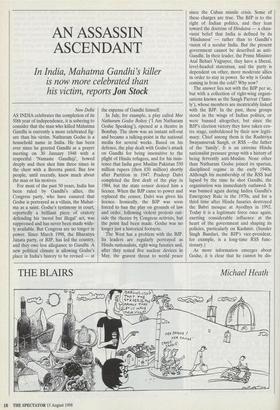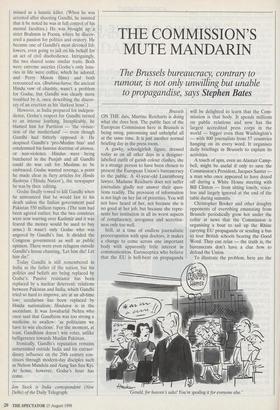AN ASSASSIN ASCENDANT
In India, Mahatma Gandhi's killer is now more celebrated than
his victim, reports Jon Stock New Delhi AS INDIA celebrates the completion of its 50th year of independence, it is sobering to consider that the man who killed Mahatma Gandhi is currently a more celebrated fig- ure than his victim. Nathuram Godse is a household name in India. He has been ever since he greeted Gandhi at a prayer meeting on 30 January 1948 with a respectful `Namaste Gandhiji', bowed deeply and then shot him three times in the chest with a Beretta pistol. But few people, until recently, knew much about the man or his motives.
For most of the past 50 years, India has been ruled by Gandhi's allies, the Congress party, who have ensured that Godse is portrayed as a villain, the Mahat- ma as a saint. Godse's testimony in court, reportedly a brilliant piece of oratory defending his 'moral but illegal' act, was suppressed and has never been made wide- ly available. But Congress are no longer in power. Since March 1998, the Bharatiya Janata party, or BJP, has led the country, and they owe less allegiance to Gandhi. A new political climate is allowing Godse's place in India's history to be revised — at the expense of Gandhi himself.
In July, for example, a play called Mee Nathuram Godse Boltoy CI Am Nathuram Godse Speaking'), opened at a theatre in Bombay. The show was an instant sell-out and became a talking-point in the national media for several weeks. Based on his defence, the play dealt with Godse's attack on Gandhi for being insensitive to the plight of Hindu refugees, and for his insis- tence that India gave Muslim Pakistan 550 million rupees (then £50 million) shortly after Partition in 1947. Pradeep Dalvi completed the first draft of the play in 1984, but the state censor denied him a licence. When the BJP came to power and replaced the censor, Dalvi was given his licence. Ironically, the BJP was soon forced to ban the play on grounds of law and order, following violent protests out- side the theatre by Congress activists, but the point had been made. Godse was no longer just a historical footnote.
The West has a problem with the BJP. Its leaders are regularly portrayed as Hindu nationalists, right-wing fanatics and, after they tested five nuclear devices in May, the gravest threat to world peace since the Cuban missile crisis. Some of these charges are true. The BJP is to the right of Indian politics, and they lean toward the doctrine of Hindutva — a chau- vinist belief that India is defined by its `Hinduness' — rather than to Gandhi's vision of a secular India. But the present government cannot be described as anti- Gandhi. In their leader, the Prime Minister Atal Behari Vajpayee, they have a liberal, level-headed statesman, and the party is dependent on other, more moderate allies in order to stay in power. So why is Godse coming in from the cold? Why now?
The answer lies not with the BJP per se, but with a collection of right-wing organi- sations known as the Sangh Parivar (`fami- ly'), whose members are inextricably linked with the BJP. In the past, these groups stood in the wings of Indian politics, or were banned altogether, but since the BJP's election victory they have taken cen- tre stage, emboldened by their new legiti- macy. Chief among them is the Rashtriya Swayamsevak Sangh, or RSS —the father of the 'family'. It is an extreme Hindu nationalist pressure group with a history of being fervently anti-Muslim. None other than Nathuram Godse joined its spartan, disciplined regime in the early 1940s. Although his membership of the RSS had lapsed by the time he shot Gandhi, the organisation was immediately outlawed. It was banned again during Indira Gandhi's Emergency Rule in the 1970s, and for a third time after Hindu fanatics destroyed the Babri mosque at Ayodhya in 1992. Today it is a legitimate force once again, exerting considerable influence at the heart of the government and shaping its policies, particularly on Kashmir. (Sunder Singh Bandari, the BJP's vice-president, for example, is a long-time RSS func- tionary.) As more information emerges about Godse, it is clear that he cannot be dis- missed as a lunatic killer. (When he was arrested after shooting Gandhi, he insisted that it be noted he was in full control of his mental faculties.) He was brought up a strict Brahmin in Poona, where he discov- ered a passion for politics and oratory. He became one of Gandhi's most devoted fol- lowers, even going to jail on his behalf for an act of civil disobedience. Intriguingly, the two shared some similar traits. Both were extreme ascetics (Godse's only luxu- ries in life were coffee, which he adored, and Perry Mason films) and both renounced sex. (Brahmacharya, the ancient Hindu vow of chastity, wasn't a problem for Godse, but Gandhi was clearly more troubled by it, once describing the discov- ery of an erection as his 'darkest hour'.) However, as India prepared for indepen- dence, Godse's respect for Gandhi turned to an intense loathing. Inexplicably, he blamed him for Partition — 'the vivisec- tion of the motherland' — even though Gandhi had bitterly opposed it. He despised Gandhi's 'pro-Muslim bias' and condemned his famous doctrine of ahimsa, or non-violence. Hindus were being butchered in the Punjab and all Gandhi could do was call for Muslims to be embraced. Godse wanted revenge, a point he made clear in fiery articles for Hindu Rashtrya ('Hindu Nation'), the newspaper he was by then editing.
Godse finally vowed to kill Gandhi when he announced that he would fast to his death unless the Indian government paid Pakistan 550 million rupees. (The sum had been agreed earlier, but the two countries were now warring over Kashmir and it was feared the money would be used to buy arms.) It wasn't only Godse who was angered by Gandhi's fast. It divided the Congress government as well as public opinion. There were even refugees outside Gandhi's house chanting, 'Let him die! Let him die!'
Today Gandhi is still remembered in India as the father of the nation, but his politics and beliefs are being replaced by Godse's. Passive resistance has been replaced by a nuclear deterrent; relations between Pakistan and India, which Gandhi tried so hard to improve, are at an all-time low; secularism has been replaced by Hindu nationalism; Hindutva is in the ascendant. It was Jawaharlal Nehru who once said that Gandhism was too strong a medicine to swallow: 'as politicians we have to win elections'. For the moment, at least, Gandhism doesn't win votes, unlike belligerence towards Muslim Pakistan.
Ironically, Gandhi's reputation remains untarnished outside India and his extraor- dinary influence on the 20th century con- tinues through modern-day disciples such as Nelson Mandela and Aung San Suu Kyi. At home, however, Godse's hour has come.
Jon Stock is India correspondent (New Delhi) of the Daily Telegraph.



























































 Previous page
Previous page